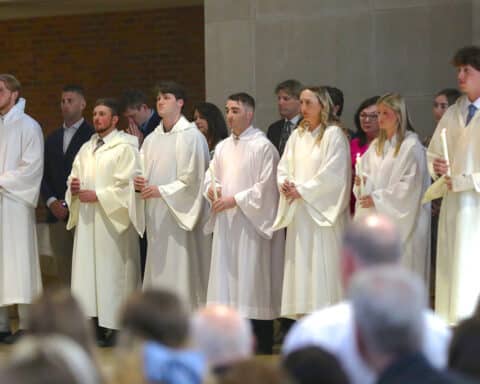How does God speak to us today? How does God enter our noisy, busy lives?
We are familiar with the story in the Hebrew Scriptures of how God spoke to the prophet Elijah. Awaiting the word of God, he lodged in a cave.
“Then the Lord said: Go out and stand on the mountain before the Lord; the Lord will pass by. There was a strong and violent wind rending the mountains and crushing rocks before the Lord — but the Lord was not in the wind; after the wind, an earthquake — but the Lord was not in the earthquake; after the earthquake, fire — but the Lord was not in the fire; after the fire, a light silent sound. When he heard this, Elijah hid his face in his cloak and went out and stood at the entrance of the cave” (1 Kgs 19:11-13).
Not in the wind or earthquake or fire, but in “the still small voice,” God spoke.
That is how God revealed the word to the prophet Elijah, and how God most frequently speaks to us. There are so many voices around, crying for our attention, bombarding our senses. How can we discern or distinguish and identify the voice of God?
Quiet, low-key nudges
We do believe that God can work powerful miracles as with Paul on the road to Damascus.
We have the signs, the miracles of Lourdes and Fátima. With faith, we pray to God to heal a sick relative. We pray to God for pleasant weather, for an end to a hurricane. Yes, God can act with miraculous interventions. But I suggest that ordinarily, God acts as in the story of Elijah, as a still, small voice. I suggest that God normally and continually enters our world, finds his way into our lives, in quiet, low-key ways. The word I like to use for these signals from God is “nudges.”
The word is familiar, but not too common. Rather than try to define the word “nudge,” let me offer other words, which I believe correspond to or describe what I mean by nudges from God. Here are some of them: feeling, confirmation, impression, inspiration, push, pull, whisper, still small voice, inner voice, a new idea, stirring, movement, disturbance, signal, thought, insight, inflaming and embracing the soul. And I wish to say that the nudge is the most common, and most important way that God enters. It is the normal way that the Spirit of Jesus, the Holy Spirit, enters into our experience.
St. Ignatius Loyola’s life
To confirm and explain this further, I turn to the spirituality and theology of St. Ignatius Loyola, as found in his own life, in his “Spiritual Exercises,” and in his letters.

St. Ignatius recounts his conversion in his “Autobiography.” He is wounded in battle and recovers in bed in his family castle. This gives him time to read and to reflect. Thinking about his future, he notices that “Our Lord was helping him, causing other thoughts,”, which entered his imagination. But then also, “thoughts of the world would follow.” The thoughts from God consoled him, made him happy and content. Thoughts of the world, however, left him sad.
He continues: “Little by little coming to know the difference in kind of spirits that were stirring: the one from the devil, and others from God.” Eventually, these desires to begin a new life “were confirmed for him by a visitation” of Mary and the Child Jesus. These reflections would become the basis for the discernment of spirits as found in the Spiritual Exercises. The point here is that Ignatius saw various spirits, forces constantly touching and influencing him.
In a sense, his mind, spirit and imagination was a battleground where the good spirit from God and the evil spirit, the devil, tried to influence him.
The Spiritual Exercises
We turn now to the Spiritual Exercises. Their goal is to help guide the one on retreat to make the correct decision in their choice of a way of life. In the introduction to the exercises, Ignatius makes some general observations. He explains that we “look for the grace of God enlightening our soul.”
Ignatius expects of the one on a retreat that the soul will be affected “by Spiritual experiences of consolation, desolation, to be troubled by different spirits.” He continues that “during time of retreat God embraces, inflames the soul,” and the one giving the retreat should be “kept informed of the various disturbances and thoughts caused by the action of different spirits.”
Clearly, these are different ways of speaking of the nudges from God (and from the evil one). St. Ignatius explains that there are three times when a good choice can be made or three ways God helps us decide. First is a direct, strong intervention, as in the conversion of St. Paul or the call of Matthew.
Here “God moves and attracts the will … the soul follows what has been manifested to it.” A second way is through the discernment of spirits, by our examination of the various movements, that break into our everyday, ordinary lives. The third way or time is when the soul is not agitated by different spirits and has free and peaceful use of its natural powers when we rely upon our human reason.
Letters of Ignatius
Turning to his letters, while there is less input, it does confirm what we are saying, that God is close to us and continually acting upon us — or nudging us. In his letter to Teresa Rejadell (“Ignatius of Loyola: Letters and Instructions,” Institute of Jesuit Sources, $40.95), Ignatius writes about “things we experience as coming from God our Lord” that Our Lord “moves and drives our soul to one action or another … opening our soul, speaking inside it without the din of words, lifting the soul to his divine love.”
He writes also of how “the enemy enters to bring us to disorder and total confusion.” Ignatius thus sees our soul as a battleground where good and bad spirits contend. We might note that, in another essay, Ignatius sees our imagination as a battleground.
This attention to the action and movement of the spirits plays a key place in Ignatian spirituality during the retreat and then in our return to everyday life through the daily examen, the examination of conscience. During this prayerful time every day, we attend to, listen, review and heed the call or the nudges from God.
Implications
Our challenge and our responsibility is to be attentive to the God who is near to us, nudging, inspiring and guiding. We should see and think of ourselves as receptacles, instruments, with the belief that God is with us. But at the same time, we must be careful and see our souls as a battleground. Not only God, but less than God — the opposite of God, the devil — is at work trying to win our souls, to have Satan’s voice heard. Respecting our freedom, God allows and permits this and promises that his grace is always there to overcome and say no to the evil nudges of Satan.
And finally, a reminder: Do not expect miracles from God, but look more to his presence, his nudges in our ordinary, everyday lives. God is with us. God wants us and invites us to cooperate and accomplish God’s work with him, and so be God’s presence and action in the world. God comes alongside us and enables us to see, hear and pay attention to God’s nudges. Listening to the holy nudge is the start. Saying yes to those daily nudges is the way to let God help guide us and our actions on the path to heaven.
Father Peter Schineller, SJ, is the archivist for the New York Province of the Society of Jesus and former associate editor of America magazine.





